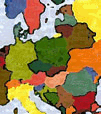The rock of Serbia may be showing signs of weathering, but it still manages to crush everything in its path. If Yugoslav President Slobodan Milošević is the rock, Montenegro may well be the next obstacle in his path.
Relations between Montenegro and Serbia have been declining in recent years. Since 1997, Montenegro has been ignoring the Milošević regime and has begun its own struggle for independence. The bloodthirsty Milošević, however, does not take kindly to talk of separation.
Montenegro remains the last state within the Yugoslav federation alongside Serbia. This position has now been brought into question by the overwhelming Serb support for constitutional change. The junior partner in the federation is now warning of another Balkan conflict.
Constitutional change
Under the terms of the now "old" constitution, Milošević would be due to relinquish his Presidential office next year. The new terms adopted on 6 July 2000 create the opportunity for popular presidential elections, in which Milošević hopes to run.
The Yugoslav Parliamentary Assembly appointed Milošević to the office of president in 1997. The constitutional changes mean that he can now be elected by "his" people and perpetuate both his power base and his dream of a "Greater Serbia."
Supporters of Milošević argue that direct election offers "the greatest possible democratic legitimacy" to the position of president. (CNN, 6 July 2000) This is perhaps true on paper, but in practice Milošević has already proved himself to be as hard as stone. Whereas stone is durable, paper can be destroyed in an instant.
Milošević is the most popular politician in Yugoslavia and direct election will cement his victory.
Montenegro out?
Constitutional change for the election of the Yugoslav President is accompanied by a change in the election of deputies to the upper chamber of the Parliament. Deputies have been chosen on an equal footing: 20 for Serbia and 20 for Montenegro.
The "new" constitution establishes the direct election of deputies. Montenegro has a voting population of 600,000. Serbia has a voting population of ten million. The new system will ensure that the junior partner is pushed out of the decision-making process.
By changing the constitution, Serbia has weakened Montenegro's powers. Pro-democratic and pro-Western, Montenegro is left debating the consequences of independence from the Yugoslav Federation.
With memories of the Kosovo conflict deeply ingrained, Montenegro has a lot to think about. There is widespread fear that, if Montenegro declares independence from the Yugoslav Federation, another Balkan conflict will ensue. Instead, they prefer to follow what is termed "creeping independence:" the gradual disassociation of Montenegro from Serbia.
NATO bombings during the Kosovo conflict heightened Montenegrin concerns that the violence would spill over their borders. However, it also raised expectations that NATO would support them if they declared independence.
When a strict Serb nationalist commandeered a large section of the Montenegrin army, it was feared that a take-over of the Montenegrin government was imminent. NATO pledged support. Milošević did not attack. Today, NATO support may not be so forthcoming, but Milošević may still attack.
The two sides of the Yugoslav Federation appear to want the same thing - out. Serbia is aggressively pushing Montenegro out of the federation and Montenegro is "creeping" toward independence.
While Montenegro may appear to desire democracy and independence, the Serbian regime seems to desire suppression of the opposition and assimilation of Montenegrins into the Serbian nation.
The tightrope
Both Montenegro and Serbia are walking a precarious tightrope: whoever loses their balance first could well get broken. Milošević has majority support within Serbia, but his threats will only carry so far outside Serbian borders. Montenegro is rapidly losing its political influence, pushing too far may increase support for Serb aggression.
Tensions have been escalating between Montenegro and Serbia since Milošević became president of the Yugoslav Federation in 1997. Assassination is fast becoming the tool of political suppression.In the last nine months, Serb opposition leader Vuk Drašković has been the victim of two failed assassination attempts, the first of which claimed the lives of several of his top advisors, the seond one coming only last month at his summer retreat in Montenegro.
Now, only last week, Goran Zugić was shot dead. Zugić was the security advisor to Montenegrin President, Milo Đjukanović. The spate of gangland murders and political assassinations that have become increasingly common in Serbia are evidently spreading into Montenegro.
The two countries are near breaking point and this week's constitutional changes could be the final straw.

|
The speaker of the Montenegrin parliament, Predrag Popović, put it more bluntly: "Yugoslavia was erased today and such a move can cost us all dearly." (BBC News, Europe, 6 July 2000)
As both countries slide closer to the centre of the tightrope, something will have to give. Montenegro is moving further into the West European fold, whilst Serbia is hemmed in by Milošević's guiding nationalist principles. Animosities are intensifying and may soon capitulate.
The year 2000 could bring yet another Balkan conflict, but one thing is certain: the fate of Yugoslavia lies in the balance. Whether a lamb to the slaughter or a flower waiting to blossom, Montenegro is on the edge...
Catherine Lovatt, 7 July 2000
Moving on:
Sources:
Institute for War and Peace Reporting
Montengro News
BBC News Online
CNN




